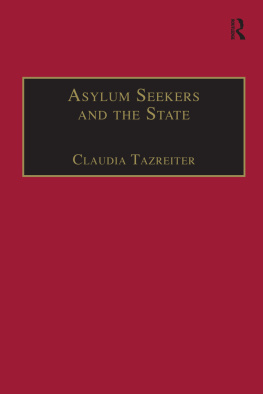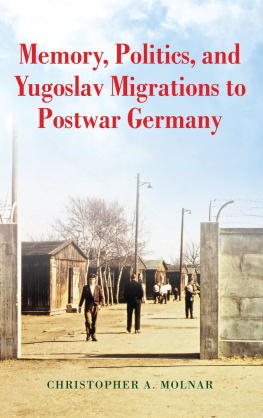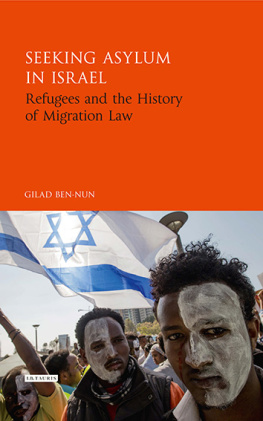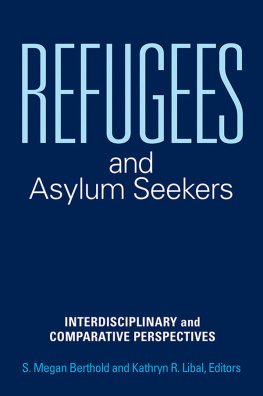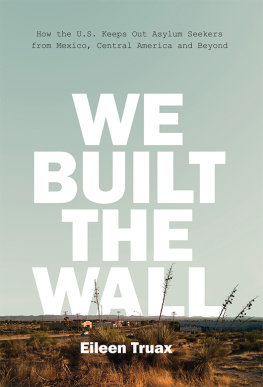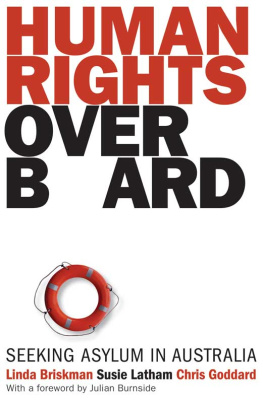ASYLUM SEEKERS AND THE STATE
Asylum Seekers and the State
The Politics of Protection in a Security-Conscious World
Claudia Tazreiter
University of New South Wales, Australia
First published 2004
by Ashgate Publishing
Published 2016
by Routledge
2 Park Square, Milton Park, Abingdon, Oxon OX14 4RN
711 Third Avenue, New York, NY 10017, USA
Routledge is an imprint of the Taylor & Francis Group, an informa business
Copyright Claudia Tazreiter 2004
Claudia Tazreiter has asserted her right under the Copyright, Designs and Patents Act, 1988, to be identified as the author of this work.
All rights reserved. No part of this book may be reprinted or reproduced or utilised in any form or by any electronic, mechanical, or other means, now known or hereafter invented, including photocopying and recording, or in any information storage or retrieval system, without permission in writing from the publishers.
Notice:
Product or corporate names may be trademarks or registered trademarks, and are used only for identification and explanation without intent to infringe.
British Library Cataloguing in Publication Data
Tazreiter, Claudia
Asylum seekers and the state: the politics of protection
in a security-conscious world
1.Asylum, Right of - Germany 2.Asylum, Right of - Australia
3.Refugees - Government policy - Germany 4.Refugees
Government policy - Australia 5.Germany - Emigration and
immigration 6.Australia - Emigration and immigration
I.Title
323.6'31
Library of Congress Cataloging-in-Publication Data
Tazreiter, Claudia.
Asylum seekers and the State: the politics of protection in a security-conscious
world / by Claudia Tazreiter.
p. cm.
Includes bibliographical references and index.
1. Refugees--Government policy. 2. Refugees--Government policy--Germany. 3.
Refugees--Government policy--Australia. 4. Refugees--Legal status, laws, etc. 5.
Asylum, Right of. I. Title.
JV6346.T39 2004
362.87'56--dc22
2004006897
ISBN 13: 978-0-7546-4069-1 (hbk)
Contents
My deep gratitude goes to the many non-government organisations and advocates for asylum seekers in both Germany and Australia who gave generously of their time and expertise and contributed to this research by taking part in interviews and making documents available to me. Many of the Germany NGOs were also gracious and generous hosts at a time when I was far away from home.
Maria Markus provided guidance, encouragement and displayed her generous humanity throughout the process of writing this book. Michael Pusey, Michael Humphrey, Clive Kessler, Jocelyn Pixley and Paul Jones from the School of Sociology and Anthropology at the University of New South Wales, offered collegiality, support and encouragement. Klaus Bade, Director of the Institute for Migration and Intercuitural Studies (IMIS), at the University of Osanbrck was a gracious host during a research visit to Germany. The German Academic Exchange Fellowship (DAAD) assisted the research with a grant which enabled me to stay in Germany for an extended period. Diarmuid Maguire in the Department of Government and International Relations at University of Sydney, supported the early stages of my research.
Finally, my family have been a source of steadfast support and encouragement through the process of research and writing.
- ACM Australasian Correctional Management
- ACSJC Australian Catholic Social Justice Council
- AI Amnesty International
- APS Australian Protective Service
- AUST The Australian
- CAT Convention Against Torture
- CDU Christlich-Demokratische Union
- CEDAW Convention on the Elimination of All Forms of Discrimination Against Women 1981
- CROC Convention on the Rights of the Child 1989
- CSU Christlich-Soziale Union
- DIMA Department of Immigration and Multicultural Affairs (1996-2001)
- DIMIA Department of Immigration, Multicultural and Indigenous Affairs (2001 -)
- DRK Deutsches Rotes Kreuz (German Red Cross)
- ECRE European Council on Refugees and Exiles
- EU European Union
- FAZ Frankfurter Allgemeine Zeitung
- FDP Freie Demokratische Partei
- FR Frankfurter Rundschau
- HREOC Human Rights and Equal Opportunity Commission
- HRW Human Rights Watch
- ICCPR International Covenant on Civil and Political Rights
- IOM International Organization for Migration
- JRS Jesuit Refugee Service
- RCOA Refugee Council of Australia
- RRT Refugee Review Tribunal
- SIS Schengen Information System
- SMH Sydney Morning Herald
- SPD Sozialdemokratische Partei Deutschlands
- STARTTS Service for the Treatment and Rehabilitation of Torture and Trauma Survivors
- SZ Sddeutsche Zeitung
- TAZ Die Tageszeitung
- TPV Temporary Protection Visa
- UDHR Universal Declaration of Human Rights 1948
- UN United Nations
- UNHCR United Nations High Commission for Refugees
- VFST Victorian Foundation for the Survivors of Torture
- WCC World Council of Churches
Chapter 1
Introduction: ambivalence and the outsider
Media outlets around the world are saturated with stories focused on security, war and terrorism. From many vantage points, East and West, in economically developed and less developed countries, fear and suspicion of outsiders has intensified into visceral hatred expressed in overt and covert acts of violence. Some acts of violence against outsiders are carried out by individuals, others are the actions of states using coercive force in both symbolic and in tangible ways to exclude certain groups and individuals. Some of these actions may well be justified. Many are not.
Individuals express opinions, and states carry out actions premised on a complex interplay of social, economic and political anxieties. Caught in the web of these anxieties are refugees and asylum seekers. Those individuals seeking protection have faced an increasingly hostile reception in the countries in which they seek asylum in the period since the end of Communism in Europe. Hostility toward refugees and asylum seekers has intensified since 2001. In no small measure, such sentiment rests on a fear of terrorism. The human rights of the most threatened and marginalised people in the world; those at risk of severe forms of persecution, torture, or loss of life - have been put at greater risk by the new emphasis on security in the developed world since the September 11, 2001 terrorist attacks on New York and Washington.
This book seeks to deal with an aspect of the global dilemma of people moving across borders in search of protection and safety. The way in which such people are received and treated in countries which are signatories to International Human Rights Conventions is significant in a number of ways. With a world that is increasingly interconnected in economic, political and in cultural ways, harsh and exclusionary measures by one state are likely to have negative knock-on effects for neighbouring states. To be sure, the root-causes of refugee flows need to be identified, and real solutions found to the violence which causes flight. At the same time, the obligations placed on states who are signatories to the 1951 United Nations Refugee Convention (hereafter, Refugee Convention ) are fundamental to ensuring those in need of protection are not placed in danger by being sent back to the source of their persecution - refouled. Indeed the test of a state's commitment to human rights principles and the spirit of the Refugee Convention, is in the treatment of asylum seekers who will almost always of necessity enter a country in a clandestine fashion in order to ask for protection. This book examines the dilemma which asylum seekers present to states they enter through the case studies of Germany and Australia.

